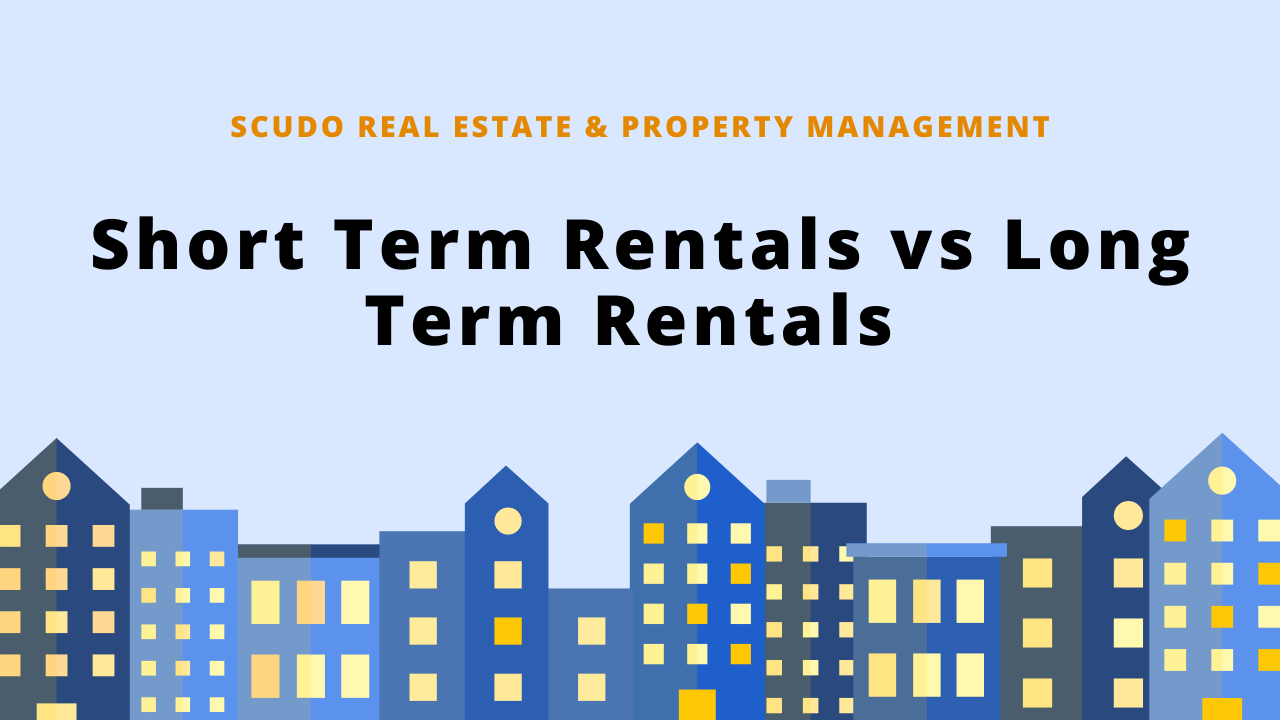As a real estate investor, you are able to turn your investment property into either a short-term or long-term rental. Much like any decision, there are pros and cons related to each of these options. In this article, SCUDO Real Estate & Property Management is going to share with you the pros and cons of both short-term rentals and long-term rentals. Let’s get started, shall we?
Long-Term Rentals
A long-term rental is just that – a property that is rented out to a long-term tenant. The period of tenancy can range from a month to 6 months or more depending on the type of agreement in operation. Broadly speaking, there are two types of tenancy agreements in a long-term rental: a rental agreement and a lease agreement.
A rental agreement runs month to month. It only ends after either party serves the other with a notice. A lease agreement, on the other hand, runs anywhere from 6 months to a year. Since the lease is fixed-term, the tenancy ends when the term expires. The following are the pros and cons of having a long-term rental.
Pros of Having a Long-Term Rental
Predictable Income
If you rent to a good tenant, then you’re going to enjoy consistent income for a long period of time.

Having consistency in rental income will make it easier for you to budget for things like repairs and maintenance!
Financing is Easier
Once you have a consistent income stream, you’ll realize that financial planning is easier and even becomes more affordable for you. Usually, financing terms and interest rates become more attractive when a lender is able to see less potential risk. That’s because, unlike short-term rentals, long-term rentals have comparatively lower vacancy rates and fewer frequent repairs.
Lower Operating Expenses
In a long-term lease, renters are responsible for basic tasks. Examples of these include cleaning the home, maintaining the yard, and paying for their utilities. In addition, long-term rentals usually cause less wear and tear on the property. This is especially true if you have a great tenant!
Low Tenant Turnover Rate
Unlike a short-term rental, the leasing process for a long-term rental is usually simple. That’s because tenants are often likely to renew their lease multiple times. This is especially true if tenants find your property desirable.
Lower Property Management Fees
Long-term rentals aren’t as involved as short-term rentals. As such, property management fees are usually more cost-effective.
Cons Having a Long-Term Rental
Less Flexibility When Raising Rent
This is one of the major drawbacks of having a long-term rental. A lease is a contractual agreement running for a certain period of time, usually a year.

This means that you’ll need to wait for the lease to expire in order to raise the rent price.
Escalating Maintenance Problems
Since tenancies are often long-term, it’s possible that minor issues may go unnoticed and escalate which can become costly. That’s why regular property inspections are key to successfully running a long-term rental. On the other hand, short-term rentals can be thoroughly inspected every time a tenant leaves.
Low-Quality Tenants
Even with the best tenant screening process in place, there’s always a chance that you’ll end up renting your property to a difficult tenant. A problematic tenant is one who always complains, pays rent late or misses entire payments, and causes damage to the property.
Short-Term Rentals
A short-term rental, also known as a vacation rental, is a furnished living space that is rented out for short periods of time. They are typically rented on a daily, weekly, or monthly basis.
The following are the pros and cons of having a short-term rental.
Pros of Having a Short-Term Rental
Higher Gross Income Potential
Unlike a long-term rental, having a short-term rental comes with lots of flexibility! You’ll be able to adjust the rent price as often as you want.

As a matter of fact, during peak seasons, you may be able to make two or three times more than the monthly rent charged for a long-term rental.
Easy Maintenance
Tenants in a short-term rental stay for a limited period of time. As such, maintenance is often easier when compared to a long-term rental. After a tenant leaves you can thoroughly clean and inspect the property for any required maintenance issues and fix them efficiently before the next tenant can occupy it.
Increased Flexibility
Short-term rentals allow you to keep your options open should you want to sell your property in the future.
Cons of Having a Short-Term Rental
Inconsistent Income
While the income from a short-term rental may be enticing, it can sometimes be inconsistent. There is always a risk that a short-term rental unit may remain unoccupied for an extended period of time. Ultimately, when renting your property long-term, it’s easier to predict how much income you can expect every month.
Higher Operating Expenses
Maintaining a short-term rental can be more intense – especially if your tenant is renting the property as an alternative to a hotel room.

Short-term rentals, unlike many long-term rentals, are furnished and need to be consistently stocked with toilet paper, towels, sheets, and other personal items.
Managing Utility Expenses
When renting out a short-term rental, you’ll be responsible for paying utilities. While you can add these costs to the rent amount, additional bills like electricity, gas, trash, water, and even cable TV, can prove difficult to manage.
Conclusion
There you have it – a list of pros and cons related to having a short-term vs a long-term rental! Luckily, after examining this list, you’ll be in a better position to make the right investment move.
If you need any help in managing your short or long-term rental properties, or are concerned about making the right choices for your real estate investment, contact SCUDO Real Estate & Property Management today – our team is ready to help you achieve your investment goals!


